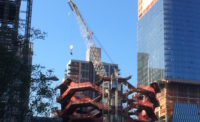Workforce
Building Firms Owe Misclassified Workers $1.75M in D.C. Lawsuit Pact

Apartment tower in Washington, D.C. is among city projects on which electrical contractor Power Design Inc. worked—with the firm and others agreeing in settlement to restore wages and benefits to employees misclassified as contractors.
Image: Courtesy of DCS Design
In what the Washington, D.C., attorney general termed as the largest workers’ rights settlement agreement in the district's history, a major specialty contractor and other construction firms must pay more than $1.75 million in restitution to about 1,200 construction employees denied overtime wages, sick leave and other benefits as a result of being misclassified as independent contractors on building projects in the city.
Totaling $3.45 million, including civil penalties and attorney fees, the settlement announced July 29 by the office of Attorney General Brian Schwalb resolves a lawsuit he brought in 2022 against Power Design Inc., a St. Petersburg, Fla.-based electrical contractor; general contractor John Moriarty & Associates, Arlington, Va.; several local labor brokers; and electrical subcontractors that include MBJ Electric and K&K Electric & Construction, both of Maryland.
The misclassification practices, which spanned eight Power Design projects in the District of Columbia, were part of a deliberate attempt to suppress labor costs and increase profits, claimed the suit. The city said Power Design has worked on more than 200 projects across the Washington, D.C. region, and has been frequently used by Moriarty as a subcontractor. Because city law holds general contractors liable for labor violations committed by subcontractors they employ, the agency sought to hold Moriarty accountable for subcontracting with companies that systematically misclassified workers.
In addition to the monetary payouts, the settlement’s injunctive terms require the companies to overhaul their payroll and contracting practices to prevent future worker misclassification.
Power Design ranks No. 28 on ENR’s current Top 600 Specialty Contractors list, with $987 million in 2022 revenue. The firm must provide certified reports to Schwalb for the next three years to demonstrate compliance with the terms of the settlement agreement and with District of Columbia law. Moriarty must include language in all future subcontracts for local projects requiring subs to strictly adhere to all wage and hour laws, collect names of every person who works on the projects and prominently post bilingual jobsite notices that inform workers of their rights under city labor laws.
In agreeing to the settlement, Power Design and Moriarty admit to no wrongdoing or liability. In a statement provided to ENR, Power Design claims that while it was paying the workers “amounts in accordance with the law,” its subcontractors MBJ and K&K “were not passing down those benefits to the employees who were actively working” on those projects at the time.
The statement adds that Power Design took “swift, corrective action to promptly address the subcontractors’ errors and fully compensate the affected employees,” while also severing its relationship with the two firms. According to a Power Design spokesperson, fewer than 100 employees from MBJ and K&K were working on its projects when the alleged misclassification errors occurred.
ENR was unable to reach the two subcontractors for comment.
In a separate statement, Moriarty said the company “has never been part of any scheme to pay reduced wages to workers” and agreed to the settlement’s injunctive terms “to assist the Attorney’s General’s office in developing future cases against subcontractors who do not follow the law.”
Power Design and its labor brokers faced a similar earlier misclassification lawsuit from the District of Columbia Attorney General, leading to a $2.75-million settlement in 2020. According to the Power Design statement, adjustments to the company’s subcontracting program completed the following year “ensure all subcontractors involved in [firm] projects strictly adhere to rigorous payroll procedures—including working with a third-party payroll auditor and guaranteeing correct compensation classification for every employee contributing to a project.” The statement adds that Power Design has had no compliance issues since implementing the improvements.
The January 2021 policy changes "were not related to the 2020 settlement, which we've fully complied with," a company spokesperson told ENR. "These updates were voluntary, proactive measures stemming from our ongoing compliance efforts.
"They exceeded the 2020 settlement requirements, targeting areas for improvement in [city] subcontractor practices," says the spokesperson.
But the Attorney General says it uncovered evidence that Power Design fell short of meeting the 2020 settlement’s requirements, having “failed to implement sufficient policies to ensure compliance” with the district’s Workplace Fraud Act and Minimum Wage Revision Act, leading to the 2022 lawsuit.




